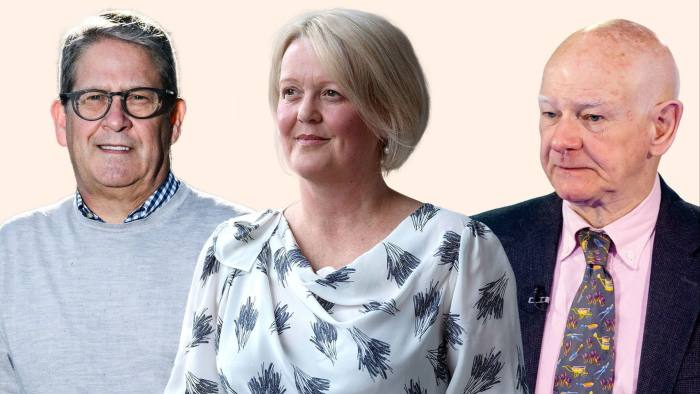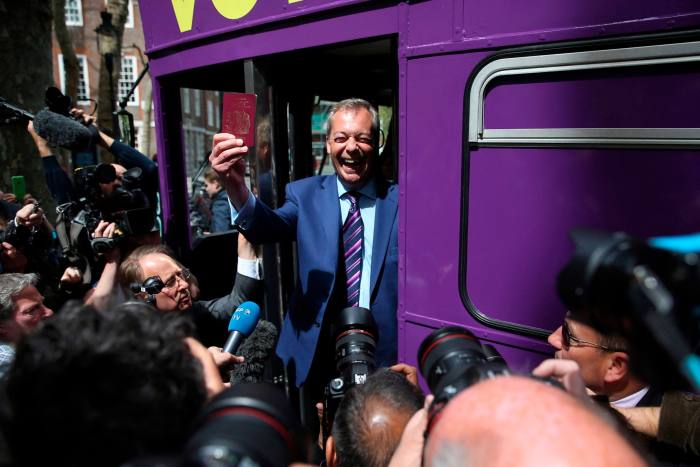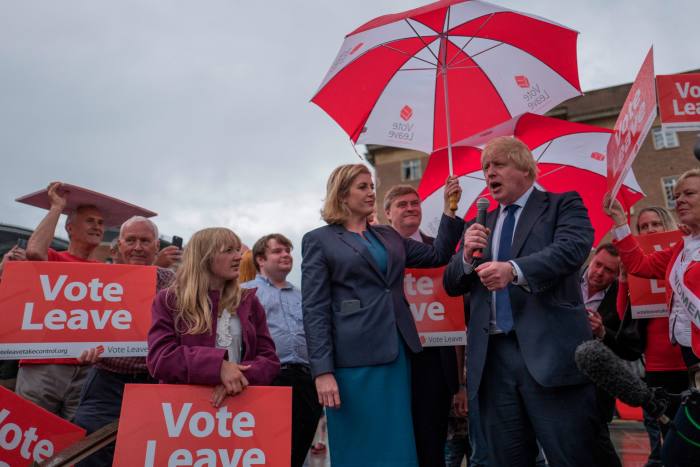Fresh from taking down one of the country’s most important bankers, Nigel Farage has a new target: Britain’s entire financial system.
One of the principle architects of Brexit, Farage wants to be the standard bearer for the thousands of other people who have been stripped of their bank accounts and credit cards for political or other reasons.
“I’m now a champion and crusader for men and women who have been closed down by the banks,” Farage told the BBC.
This new campaign kicked off a month ago when the 59-year-old Farage, a self-styled anti-elitist, complained he had been dropped as a longstanding client because of his politics by the most exclusive bank in Britain: Coutts.
By this week, his pressure had led to the resignation of Dame Alison Rose, chief executive of parent company NatWest, in a dramatic midnight boardroom meeting late on Tuesday. Coutts boss Peter Flavel also stood down, while Sir Howard Davies, chair of NatWest, is under heavy pressure.

Farage’s story has struck a nerve with the general public because it raised wider questions about the ability of banks to remove accounts without explanation, leaving them or their small businesses cut off from the mainstream financial system. In an increasingly cashless world, having a bank account has become an essential service.
David Davis, former Brexit secretary, likens closing someone’s bank account to cutting off their water or electricity supply. “You should be able to get a bank account regardless of your political views, whether you are a communist or a fascist,” he says.
The story has also fed into a culture war backlash pushed by rightwing politicians on both sides of the Atlantic against the perceived over-reach of the corporate ESG agenda.
Under Rose, NatWest and Coutts promoted an agenda built around the idea of “purpose”, which included climate change, sustainable living and LGBTQ+ rights. Farage, the former Brexit party leader who is a friend of former US president Donald Trump, dubbed NatWest a “woke warrior”.
The resignations this week are “a sign that corporations and their leaders are being roped into the culture wars”, says Professor André Spicer, dean of Bayes Business School.
Rose quit after admitting she briefed a BBC journalist with misleading information about Farage. “What brought her down was not the decision itself [to close Farage’s account],” adds Spicer. But she ended up “facing a tenacious culture warrior looking to make political capital out of this situation”.
Banks to the wall
Even before Farage went to battle with Coutts, Britain’s banks were already in the line of fire. As the cost of living crisis continues to bite, parliamentary committees have wanted to know why mortgage rates have risen faster than the returns on most deposit accounts.
Farage’s complaint spoke to a wider dissatisfaction with banks, which have closed more than 5,000 branches since 2015 and are yet to repair their reputations after the financial crisis. NatWest is still 39 per cent owned by the government after its £45.8bn 2008 bailout, when it was known as RBS.

“Farage is a divining rod for anger and outrage in this country. The closure of bank branches, the experience people have with their banks, the difficulty of doing anything online, means people don’t hold banks in high regard,” says John McTernan, a Labour former Downing Street adviser.
Farage, who says he was refused bank accounts by at least nine banks because of his political profile, is launching a campaign for the rights of others who have lost their accounts because of their views.
“Since I told my own story this month, I have been inundated with tales from others in genuine distress who have also suffered the indignity of being ‘de-banked’.”
As regulators and law enforcement have tightened the rules on money laundering in recent years, there has been a steady increase in individuals suddenly losing their bank accounts with no clear reason or right to appeal. A huge proportion of those cases are due to suspected financial crime.
Adam Hadley, executive director of Tech Against Terrorism, an online counter-terrorism group, says Farage had raised “valid concerns about potential over-reach” by banks, but says there still needs to be “careful safeguards to stop harmful actors”.
But many cases have no such connection. Peter Fudakowski, a 68-year-old Oscar-winning film producer, had his business account closed by NatWest. In March the Financial Ombudsman Service ruled against him on the basis the account was not being used.
But Fudakowski says the account had six figures in it earmarked for filming, which was paused during the pandemic. “I wasted so much time and energy on this, [the decision] was irrational, illogical and unfair. What was I supposed to do?” he told the Financial Times. “They use all sorts of excuses to get rid of you.”
NatWest said it had “acted proactively in this case to seek out the outstanding information required, writing to the customer to outline clearly what was needed and extending the deadline several times”.
In February, a Facebook group called “NatWest closed down my account” had already reached 8,600 members, even before the Farage publicity. (It has 10,800 now.) Participants have been sharing information on how to submit a data subject access request, or DSAR, to the lender to find out the real reason why they have been excluded.
This was the tactic that Farage used to obtain a 40-page dossier that proved Coutts had been planning to jettison him for months. Memos revealed its reputational risk committee said he was “pandering to racists” and a “disingenuous grifter”. His politics were deemed “at odds with our position as an inclusive organisation”.
Bankers admit they are constantly trying to balance the risk of reputational damage with commercial considerations. A senior figure at NatWest conceded that Farage, despite Coutts’s dim view of his politics, was unlikely to have been abandoned if he were a billionaire.

People familiar with the issue remember how delicately Barclays had to tread when closing the account of Ghislaine Maxwell in early 2021. The bank started the process to remove her account for reputation reasons before she had gone to trial or been convicted for aiding Jeffrey Epstein’s sexual abuse of underage girls.
The bank delayed until £130,000 had been transferred to her account as a downpayment from the sale of her Belgravia house to a buyer who was at the time unknown. It then justified the closure by saying the deposit could have put Barclays in a position where it “might break a law, regulation, code or other duty”.
Barclays said it cannot comment on individual customers.
HSBC and Standard Chartered — which are based in London but make the vast majority of their profits in emerging markets, particularly Asia and China — face even trickier geopolitical questions.
In 2020, StanChart closed all bank accounts it operated for embassies after a review found many were flouting strict compliance and anti-money laundering rules under the guise of diplomatic privilege, leaving it vulnerable to regulatory censure.
To avoid upsetting any individual country — in particular China — it decided to close every one, not just the worst offenders, the FT has previously reported.
One rival banking executive says they are worried about a deluge of complaints and regulatory sanctions now public awareness about account closures has increased.
“I fear this is going the way of the Wells Fargo scale of scandal,” the person said, referring to the US bank being fined $3bn for fraudulently opening millions of customer accounts.
Bill Winters, Standard Chartered’s chief executive, says that it is always complicated for banks to “navigate the cross-currents of various laws and sanctions”, but that banks should not screen clients for their politics and public statements.
Rose and Flavel had paid a “heavy price” for an “error in judgment”, he says. “That doesn’t mean there is a structural problem,” he adds. “I suggest we accept the apologies, and the extraordinary acts of resignation and move on.”
Yet many of those individuals who have lost their bank accounts say a reckoning was long due.
Sharokh Koussari, discrimination lawyer at Axiom DWFM, says the Farage furore should highlight the way that banks had often “arbitrarily and very often unfairly” closed accounts on the pretext of de-risking — hitting certain ethnicities, including Iranians, particularly hard.
The number of entrepreneurs seeing their business accounts closed — often with no reason — has accelerated in recent years, according to Craig Beaumont, chief of external affairs at the Federation of Small Businesses.
“A lot of the time people are embarrassed that this has happened to them so they wouldn’t necessarily go to the ombudsman, so I think the official figures hugely underestimate how big this problem is,” he says. “It’s good that the government has finally acted on this. It’s a shame it took Nigel Farage for them to do it.”
Political zeitgeist
The other reason Farage’s fight with NatWest has such resonance is the outsized political influence he continues to enjoy — even though he does not occupy any elected office.
A rightwing Eurosceptic, Farage was underestimated for years in the run-up to the 2016 Brexit referendum, which the Leave campaign won against the odds, leading to the resignation of prime minister David Cameron in the process. This week’s episode shows that he retains an uncanny ability to tap into the political zeitgeist and unnerve the establishment.
Although no longer on the frontline of politics, Farage remains honorary president of the Brexit party’s successor vehicle, Reform UK, which is polling at about 8 per cent.

Tory ministers are anxious about the idea of Farage actively re-entering politics, at the expense of their party’s core vote as polls show the Conservatives trailing their main opponents, the Labour party.
Within days of Farage first raising his concerns about Coutts in late June, Rishi Sunak, the prime minister, said it would “not be right” for a bank to shut an account of someone “exercising their right to lawful free speech”.
The Treasury has since accelerated changes to banking rules so they have to give longer notice — and clearer explanations — when they dump clients.
“The [Tory] party is very worried that Nigel Farage is putting together a slate of candidates for the next election,” says Tim Montgomerie, a former adviser to Boris Johnson in Downing Street. “Anything they can do to make him more friendly to the Conservatives is in their interests.”
At the same time, he says, many Tories genuinely share Farage’s “genuine moral disdain for the woke agenda” in corporate Britain. “Milton Friedman said that chocolate companies should make chocolate and make money for their shareholders . . . Companies should stick to their core remit.”
Many politicians take the subject personally because of the particular difficulties they face getting bank accounts.
Almost anyone who holds a prominent public position — such as MPs or peers — are designated “politically exposed persons” because of concerns they could be more susceptible to money laundering or terrorist financing. That means they are subjected to enhanced checks by banks. The Coutts notes described Farage as a “lower risk PEP”.
Chris Philp, policing minister, says “quite a few MPs” have experienced difficulties getting bank services, as well as their “spouses and even children”.
Lord Michael Forsyth, a former Tory minister, captured the anger among some in the political elite when he talked about the experience of he and his daughter, who both banked at Coutts.
“The manager said to her, ‘Is there any chance you could move to another bank because you are such a pain to look after because your dad is a PEP?’” he told the House of Lords. “That is an absolute disgrace.”
Some campaigners hope the Farage imbroglio will highlight the broader issue that some 1.3mn adults in the UK do not have a bank account, according to FCA estimates.
“I’ve seen this over and over with refugee clients that I work with,” says Nina Mohanty, an adviser at Talent Beyond Boundaries, which provides employment for refugees. “They try and go to a bank and it’s usually the high street banks who say, sorry computer says no.”
Additional reporting by Siddharth Venkataramakrishnan and Rafe Uddin
Stay connected with us on social media platform for instant update click here to join our Twitter, & Facebook
We are now on Telegram. Click here to join our channel (@TechiUpdate) and stay updated with the latest Technology headlines.
For all the latest Business News Click Here
For the latest news and updates, follow us on Google News.
